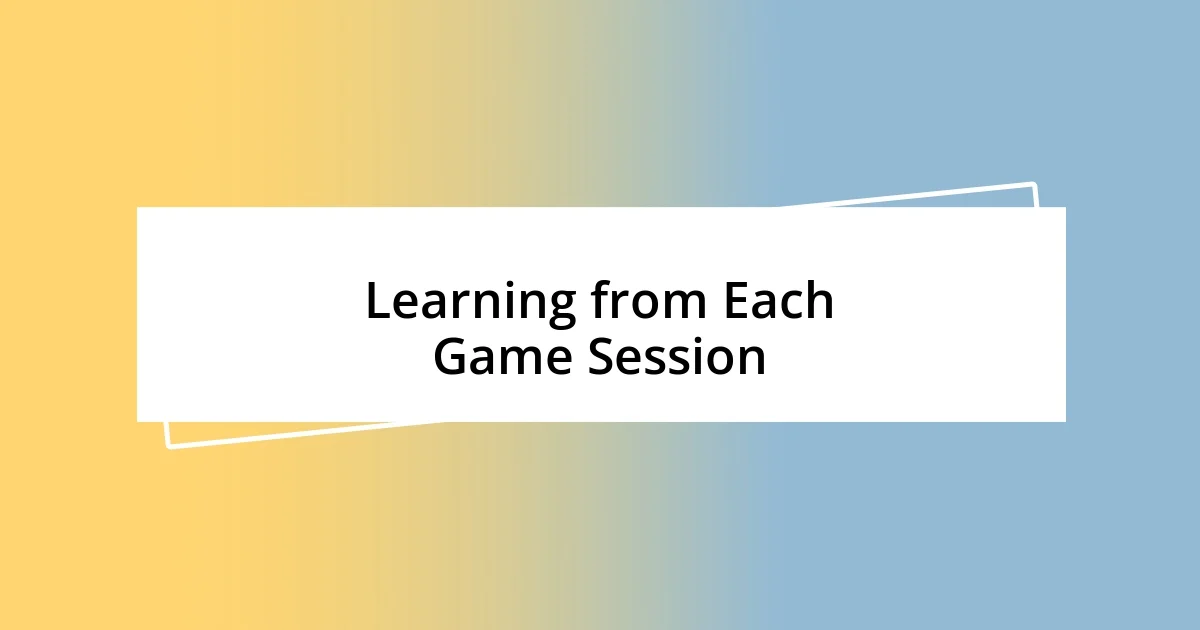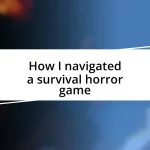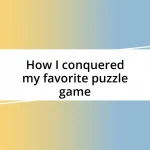Key takeaways:
- Understanding game mechanics, particularly the haunt mechanic, significantly influences strategy and player interactions in “Betrayal at House on the Hill.”
- Building adaptability into your gameplay and character selection enhances both enjoyment and success, allowing players to respond effectively to evolving scenarios.
- Frequent reflection and learning from each game session improves teamwork, communication, and strategic planning in future games.

Understanding the Game Mechanics
In “Betrayal at House on the Hill,” understanding the game mechanics is crucial for tuning into the thrills of betrayal and survival. Each player’s role is vital, whether they’re exploring eerie rooms or uncovering dark secrets. I remember the first time I played; the sudden shift when one friend turned against the rest was a shocking twist that highlighted how fundamentally the game can change based on mechanics like the haunt mechanic.
The haunt dialogue is particularly fascinating. It’s not just about the moment when betrayal occurs; it’s about how the chosen traitor and their former allies adapt their strategies. Have you ever felt that mix of excitement and horror as alliances shift? It’s like a spontaneous dance; everyone tries to outsmart each other, and that tension keeps me on the edge of my seat.
Moreover, each scenario in the game has unique conditions that affect how players interact and respond. Certain traits and items come into play, and I’ve often found myself strategizing my next move while reflecting on past games. It’s this constant recalibration of tactics based on the unfolding narrative that makes every session feel fresh. Through my own experience, I’ve learned that understanding these mechanics leads to a deeper appreciation of the storytelling aspect of the game, making each betrayal sting even more.

Building a Winning Strategy
When it comes to building a winning strategy in “Betrayal at House on the Hill,” I’ve learned that adaptability is key. The game is unpredictable, and what worked in the earlier rounds may not hold up as the haunt evolves. During one intense evening, I found myself completely outmaneuvered simply because I ignored the dynamic nature of alliances. I had assumed my partner and I were solid, but when the betrayal unfolded, I had to scramble to fend for myself. I wish I had anticipated that shift and prepared alternative plans.
Here are a few essentials I focus on when strategizing:
- Know Your Character: Each role comes with unique strengths and weaknesses. Play to those.
- Observe Other Players: Watching your opponents can provide clues about their strategies and potential betrayals.
- Collect and Manage Items Wisely: Resources can turn the tide in critical moments, so prioritize your inventory.
- Adjust Your Strategy Based on the Haunt: Each scenario demands different tactics. Stay flexible and ready to pivot.
- Create Alliances, but Stay Cautious: Trust is crucial, but remember, it can be your downfall—the closer you are, the harder the betrayal can hit.
In my experience, the thrill of adapting to these strategies is what keeps the game engaging. Embracing the uncertainty and planning accordingly can lead to a memorable—and often victorious—session.

Choosing the Right Characters
Choosing the right characters in “Betrayal at House on the Hill” significantly impacts the game’s dynamics. I’ve seen firsthand how the character selection sets the tone for the whole experience. For instance, one time I chose the character with the lowest sanity, thinking it would add a fun twist. However, it led to a tense game where I felt like a complete liability. Balancing character strengths with your personal play style can enhance not only your chances but also the enjoyment of gameplay.
Each character in the game offers diverse abilities that can shape both strategy and alliances. I remember when I played the Mystic; her ability to look at the top card of the event deck turned what seemed like a hopeless situation into a strategic advantage. This added an exciting layer of decision-making. Have you ever considered the impact of abilities on gameplay? Choosing a character aligned with your role or play style can mean the difference between an enjoyable game or a frustrating one.
Additionally, character selection also influences interpersonal dynamics among players. Picking a popular character can sometimes lead to unfair targets in a competition that often feels like a betrayal in itself. I find that players can become fixated on specific characters, leading to a predictable game. When was the last time you chose an unexpected character? Stepping outside the norm has often led me to discover new strategies that flip the game in delightful ways.
| Character | Strengths |
|---|---|
| The Mystic | Can look at the top card of the event deck; great for foresight in decision-making. |
| The Soldier | Higher combat abilities; excels in confrontations and survival. |
| The Explorer | More movement points; ideal for fast exploration of the house. |
| The Sensitive | Higher sanity; better equipped to deal with haunt after effects. |

Managing Resources Effectively
Managing your resources effectively in “Betrayal at House on the Hill” can be a game-changer. I once found myself in a precarious situation, hoarding items that I thought were valuable. In reality, I was so fixated on a couple of strong cards that I neglected to utilize the ones I had earlier. The moment the haunt began, I realized I had trapped myself. Keeping a diverse collection of items can give you strategic options, so I suggest frequently reassessing what you have and what you need.
I’ve also learned the importance of pacing item usage. There was a time when I rushed to use a powerful item too early, thinking it would grant me the upper hand. Instead, I found myself vulnerable later in the game when I needed that resource most. When managing resources, a well-timed approach often makes the difference. Have you ever seen a single item solidify or derail a player’s strategy? Trust me, holding onto certain resources until the right moment can be incredibly powerful.
Furthermore, it’s essential to consider how you share or trade resources with other players. In one memorable game, I traded a healing item with my opponent. It was a gamble—but it paid off for both of us. That decision not only allowed me to make a new ally but also shifted the game dynamics entirely. I reflect on how sharing can be a strategic play; it’s about weighing risks versus rewards. By cultivating relationships and understanding when to cooperate or compete, you’re managing not just your resources but also your social capital in the game. How do you navigate resource sharing?

Leveraging Team Collaboration
Collaboration in “Betrayal at House on the Hill” is vital for maximizing your chance of success. I recall a game where I and my fellow players worked seamlessly to gather information about the house’s layout. We communicated consistently, sharing discoveries like open rooms and hidden passages. This collective effort not only enhanced our navigation but also fostered a sense of camaraderie that made the game even more thrilling. Have you noticed how teamwork can transform gameplay? I genuinely believe that the more you collaborate, the more rewarding the experience becomes.
During one intense session, we found ourselves facing a formidable haunt, and I witnessed how strategic collaboration altered our fates. Instead of going solo, we divided roles—some focused on exploration while others prepared defenses. I remember feeling a rush of adrenaline knowing there was a plan in place. It reminded me that relying on each other’s strengths can turn the tide, especially when facing uncertainty. When was the last time you leaned on a teammate in a crucial moment? Trusting your teammates can be as important as any in-game item.
Sometimes, it’s the little moments of teamwork that create lasting memories. I recall a game where my strategy blossomed after I proposed a vote on the best course of action. Everyone chimed in, and we collectively decided to investigate the attic rather than splitting our resources. The excitement in the room was palpable, as each voice added weight to our choices. Have you ever felt that thrill of unity? With each collaborative decision, we not only enhanced our chances of survival but deepened our relationships as players. It’s those connections that often enrich the overall experience.

Adapting to Changing Scenarios
Adapting to changing scenarios in “Betrayal at House on the Hill” is essential for survival. I remember a time when the room layout shifted unexpectedly during a game; the haunt was triggered, and I suddenly found myself cut off from my allies. Rather than panicking, I took a deep breath and quickly reassessed my options. Have you ever faced an abrupt change like that? It taught me that flexibility is just as critical as a solid strategy.
In another game, misjudgments about the haunt’s goals led to cascading misfortunes for my team. The plan was to gather strength and stick together, but we were caught unprepared. I realized in that moment how crucial it is to anticipate potential twists in the gameplay. Are you good at thinking on your feet? I’ve learned that staying alert to the evolving situation and adjusting my strategy accordingly has saved me more times than I can count.
It’s fascinating how often the game mirrors life in this regard. Recently, I found myself adapting not just my gameplay, but also my interactions with others. When a friend and I were divided by shifting room placements, we improvised a series of signals to communicate silently. The connection we forged in that chaotic moment built not only our survival chances but also our bond. Have you ever created a system of understanding under pressure? It’s moments like those that reinforce the value of adaptability, revealing new layers of strategy and teamwork that might not be obvious at first glance.

Learning from Each Game Session
Learning from each game session of “Betrayal at House on the Hill” has become a cornerstone of my gaming experience. After every session, I find myself reflecting on what worked and what didn’t. One game comes to mind; my team initially struggled with a complex haunting, but as we reviewed our decisions afterward, we realized how crucial our communication was. Have you ever dissected a game session like that? Identifying those pivotal moments can provide insights that make future sessions even more enjoyable.
I vividly remember a time when our group faced a particularly chaotic haunt that led to miscommunication, ultimately costing us the game. In our post-game discussion, we uncovered misaligned strategies that stemmed from unclear roles. This kind of debriefing has become essential for me. It’s almost like a team huddle after a tough match, where we can candidly discuss our feelings about the decisions we made. Isn’t it fascinating how analyzing past experiences can lead to growth? This practice has not only helped us improve strategic planning but also strengthened our trust in one another, enhancing our overall gameplay.
Gaming lessons often extend beyond the board, too. After a session where we nearly won but failed due to a last-minute oversight, I felt a mix of disappointment and determination. I approached my teammates with an idea: let’s establish a checklist for critical decisions. By turning our pain points into proactive strategies, we embraced the idea of learning from losses, turning them into opportunities for growth. Don’t you find that failures, if addressed positively, can become stepping stones toward success? Each game reinforces the concept that every experience, whether triumphant or challenging, enriches our understanding of both the game and each other.














